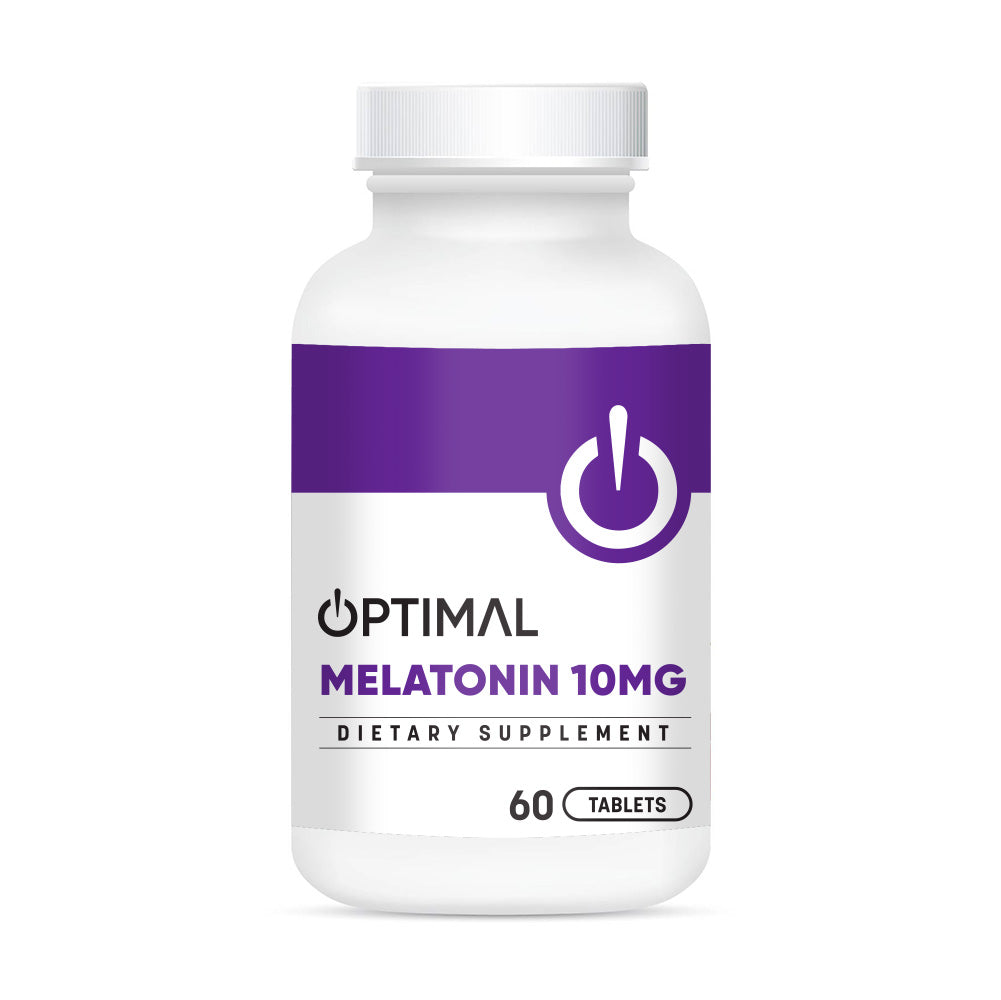Melatonin 10mg
Melatonin 10mg
Couldn't load pickup availability
Clinical Applications
- Helps Regulate the Body’s Circadian Rhythm
- Promotes Immune Cell Activity
- Provides Antioxidant Activity Directly and Indirectly
- Maintains Normal Inflammatory Balance
Melatonin is primarily produced by the pineal gland but also in the bone marrow, platelets, GI tract, eyes, skin and lymphocytes. Its chemical precursor is serotonin, a neurotransmitter derived from tryptophan. Serotonin must be acetylated and methylated to form melatonin. Synthesis and production of melatonin is affected by light exposure to the eyes; serum concentrations of melatonin are typically low during the daytime hours and increase as night falls. Since it has important effects on circadian rhythms, melatonin has also been reported to have significant effects on reproduction in addition to sleep-wake cycles and antioxidant function.
Suggested Use:
1 tablet per day or as recommended by your health care professional.
*These statements have not been evaluated by the Food and Drug Administration. This product is not intended to diagnose, treat, cure or prevent any disease.
Benefits
Deficiency
Nighttime secretion of melatonin peaks between one to three years of age and nocturnal levels naturally decline with age. Light inhibits melatonin secretion, so when the body is not exposed to an appropriate amount of environmental light, melatonin levels decrease. Research suggests that melatonin supplementation supports healthy sleep patterns in certain individuals, such as the elderly, individuals with nighttime working hours, or people traveling across time zones. Low levels of melatonin in the body are often associated with occasional sleep disturbances that may impact overall health.
Sleep Support
Melatonin supports the quality of healthy sleep as it relates to falling asleep, sleep efficiency and awakening. In adults, studies have shown that doses between 0.3-75 mg have a positive effect on increasing total sleep time and reducing the time it takes to fall asleep.
Immune Support
Melatonin has been shown to be a powerful antioxidant and antioxidant inducer. It supports glutathione production, and stimulates intracellular antioxidant enzyme production, including superoxide dismutase, glutathione peroxidase and glutathione reductase. It has also been found to scavenge free radicals and promote cytokine balance, which helps maintain normal inflammatory balance. Specifically, melatonin has been shown to have an inhibitory effect on the NLRP3 inflammasome. Melatonin is also able to pass through the lipid part of low-density lipoprotein (LDL) and act as an antioxidant in cells. It has been found to maintain healthy blood pressure levels and improves measures of quality of life such as mental health, vitality and temporarily relieves body aches in young adults.
*These statements have not been evaluated by the Food and Drug Administration. This product is not intended to diagnose, treat, cure or prevent any disease.
Supplement Facts

Other Resources
Clinical Applications
- Helps Regulate the Body’s Circadian Rhythm
- Promotes Immune Cell Activity
- Provides Antioxidant Activity Directly and Indirectly
- Maintains Normal Inflammatory Balance
Melatonin is primarily produced by the pineal gland but also in the bone marrow, platelets, GI tract, eyes, skin and lymphocytes. Its chemical precursor is serotonin, a neurotransmitter derived from tryptophan. Serotonin must be acetylated and methylated to form melatonin. Synthesis and production of melatonin is affected by light exposure to the eyes; serum concentrations of melatonin are typically low during the daytime hours and increase as night falls. Since it has important effects on circadian rhythms, melatonin has also been reported to have significant effects on reproduction in addition to sleep-wake cycles and antioxidant function.
Suggested Use:
1 tablet per day or as recommended by your health care professional.
*These statements have not been evaluated by the Food and Drug Administration. This product is not intended to diagnose, treat, cure or prevent any disease.
Deficiency
Nighttime secretion of melatonin peaks between one to three years of age and nocturnal levels naturally decline with age. Light inhibits melatonin secretion, so when the body is not exposed to an appropriate amount of environmental light, melatonin levels decrease. Research suggests that melatonin supplementation supports healthy sleep patterns in certain individuals, such as the elderly, individuals with nighttime working hours, or people traveling across time zones. Low levels of melatonin in the body are often associated with occasional sleep disturbances that may impact overall health.
Sleep Support
Melatonin supports the quality of healthy sleep as it relates to falling asleep, sleep efficiency and awakening. In adults, studies have shown that doses between 0.3-75 mg have a positive effect on increasing total sleep time and reducing the time it takes to fall asleep.
Immune Support
Melatonin has been shown to be a powerful antioxidant and antioxidant inducer. It supports glutathione production, and stimulates intracellular antioxidant enzyme production, including superoxide dismutase, glutathione peroxidase and glutathione reductase. It has also been found to scavenge free radicals and promote cytokine balance, which helps maintain normal inflammatory balance. Specifically, melatonin has been shown to have an inhibitory effect on the NLRP3 inflammasome. Melatonin is also able to pass through the lipid part of low-density lipoprotein (LDL) and act as an antioxidant in cells. It has been found to maintain healthy blood pressure levels and improves measures of quality of life such as mental health, vitality and temporarily relieves body aches in young adults.
*These statements have not been evaluated by the Food and Drug Administration. This product is not intended to diagnose, treat, cure or prevent any disease.

Share


Subscribe to our emails
Be the first to know about new supplements and exclusive offers.


